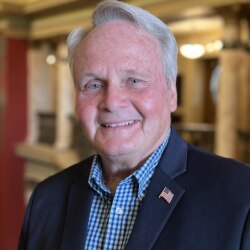Mike Mansfield and the Japanese
"In 1988, on behalf of America and with Mike Mansfield’s support, President Ronald Reagan formally apologized for the internments and publicly admitted they were not justified."
When President Jimmy Carter appointed Montana’s distinguished, long-time U.S. Senator Mike Mansfield as U.S. Ambassador to Japan in 1977, he knew he had picked a winner. The Senator was embraced by the Japanese in great measure because they knew he had opposed the rounding up of Japanese Americans by the Roosevelt administration during World War II.
The internment of almost 120,000 Japanese Americans in the wake of Pearl Harbor remains one of the blackest marks against the Roosevelt administration. It flew in the face of FDR’s State Department, which asserted that Japanese Americans were loyal and posed no threat. “There is no Japanese ‘problem’ on the Coast,” it declared.
Nearly a thousand Japanese Americans were sent to Fort Missoula in March 1942. Before the war’s end, there would be many more held in the Treasure State.
One of the more poignant stories of this tragedy involves a man named Ralph Lazo, who died in January 1992 at the age of 67. The headline on his obituary in The New York Times read, “Ralph Lazo, Who Voluntarily Lived in an Internment Camp.”
Voluntarily lived in an internment camp? Who in the world would choose to do such a thing and why?
Ralph Lazo, a Mexican American from southern California, was 17 when the Japanese bombed Pearl Harbor in December 1941. He had grown up around many youngsters of Japanese ancestry and counted some of them as his best friends. When he saw them rounded up by the U.S. government to be shipped off to camps, he went with them. He thereby became “the only known person to pretend to be Japanese so he could be willingly interned.” The obit says,
“What compelled Lazo to give up his freedom for two and a half years—sleeping in tar-paper-covered barracks, using open latrines and showers and waiting in long lines for meals in mess halls, on grounds surrounded by barbed-wire fencing and watched by guards in towers? He wanted to be with his friends.”
Did you know that there was no mass detainment of people of Japanese ancestry in Hawaii, which was not yet a state but far closer to Japan than California and home to even larger numbers of Japanese? FDR proposed that very thing, but fortunately, the U.S. Army opposed it because so many of them were skilled workers necessary to the war effort.
Ralph Lazo’s story reminds me of a Biblical passage. In John 15:13, Jesus said, “Greater love has no one than this: to lay down one’s life for one’s friends.” Lazo survived the internment, as did all but a few of those he chose to be incarcerated with. But I’ll bet he would have given his life for his Japanese friends if it had ever come to that.
Probe deeply enough, and every country in the world could cough up some ugly moments from its past. Official apologies, no matter how long delayed, are rare. Fortunately, this story includes one.
In 1988, on behalf of America and with Mike Mansfield’s support, President Ronald Reagan formally apologized for the internments and publicly admitted they were not justified.
President Reagan, knowing of the great respect for Montana’s Mike Mansfield in both Japan and the U.S., had asked Mansfield to stay on as U.S. Ambassador back in 1981. Mansfield served with distinction in that post for nearly 12 years and died at age 98 in 2001.
We must never forget the injustice of FDR’s internment of Japanese Americans so that nothing like it will ever happen again.
Lawrence W. Reed writes a monthly column for the Frontier Institute in Helena, on whose board he serves. He is president emeritus of the Foundation for Economic Education and blogs at www.lawrencewreed.com.
